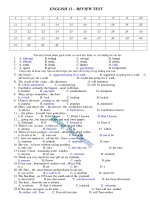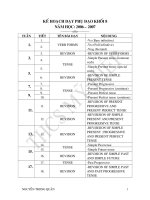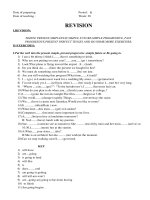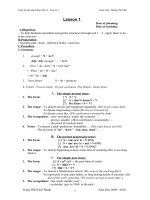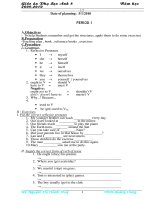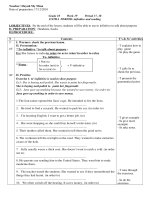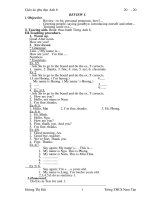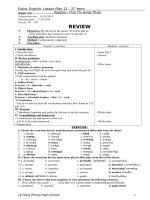phu dao anh 9
Bạn đang xem bản rút gọn của tài liệu. Xem và tải ngay bản đầy đủ của tài liệu tại đây (203.14 KB, 32 trang )
<span class='text_page_counter'>(1)</span><div class='page_container' data-page=1>
Tiet 1
<b>Tense of verbs</b>
*Aim: Reviewing all the tenses of the verbs which students have learnt
<b>A. Grammar:</b>
1.Form: 1.present simple : S + V (e,es)
2.present progresive S + is/are/am + V-ing
3.present perfect S + have/has + PII
4.past simple S + V(ed)
5.past progresive S + were/was +V-ing
6.future simple S +will +V
2.Use: (Ss write )
<b>B.Practice:</b>
Put the verbs into the correct form
1.Yesterday we (see)…… an UFO.
2.She (leave ) …….school last year. Since then she (work)……as a waitress.
3.I’m sorry.I (not/finish)…….this work yet.
4…..you(see) any good films recently?
5.How many cups of coffee (drink) today?
6.I’m not cooking today.I(cook) all the meals yesterday.In fact,I (cook) most of the
meals this week.
7.John and I (be) pen pals for nearly three years.
8.Maryam(stay) with us at the moment.She (be) my sister’s friend.
9.At 7 o’clock this morning we (go)….round the lake.
10.Phuong (not/finish) ……her homework yet.
11.Bad students never(work)…..hard.
12.The weather (become)……colder and colder in December.
13.He(work)…….in this factory for many years.
14.Minh (listen) ……to music at the moment.
</div>
<span class='text_page_counter'>(2)</span><div class='page_container' data-page=2>
tiet 2
<b>used to / be used to</b>
*Aim: further practice in used to and compare between used to and be used to
<b>A.Grammar:</b>
<i><b>1.used to </b></i>
Form: S + used to + V- infix.
Meaning: đã từng
Use: hành động đã từng xảy ra trong quá khứ,không còn xảy ra ở hiện tại
Eg: I used to live in a town.
<i><b>2.Be used to</b></i>
Form: S + be + used to/get + N/V-ing.
Meaning: quen víi, thÝch nghi víi
Use: diễn tả sự quen dần, thích nghi dần với một ®iỊu g×, mét viƯc g×
Eg: We are used to getting up early.
<b>B.Practice</b>
Complete these sentences with “used to” or “be used to “ and the correct form of
the verbs.
1.People (think) the world was flat.
2.John (take) a shower every morning before he goes to work.
3.Hai doesn’t smoke any more but he (smoke) 20 cigarettes a day.
4.Her baby girl doesn’t cry so much now but she ( cry) every night.
5.She ( live ) in Seoul, but now she lives in New York.
6.Dick( live) in Moscow.He has lived here all his life.
7.Janet ( work ) for the telephone company, but now she has a job at the bank.
8.I ( play) the violin quite well when I was younger.
9.Nam ( eat) American food now.
</div>
<span class='text_page_counter'>(3)</span><div class='page_container' data-page=3>
tiÕt 3
<b>past simple tense with “wish”</b>
<i><b>*Aim: Practising in “wish”</b></i>
<b>A.Grammar:</b>
Form: S + wish(es) + S + V ( past subjunctive)
Meaning: íc, ao íc
Use:
<b>B.Practice</b>
Write sentences beginning with “I wish”
1.I can’t play the guitar.I want I can.
-I wish…………..
2.It’s cold.I hate cold weather.
-I wish…………..
3. I live in a big city.I don’t like it.
-I wish……….
4.Mary isn’t here.I need to meet her.
-I wish……….
5.I can’t go to the party.I’d like to.
-I wish……….
6.I have to work tomorrow.I’d like to stay at home.
-I wish……….
7.I don’t have anything to eat.I’m very hungry.
-I wish……….
8.I’m sorry.I don’t live near my work.
-I wish………..
9.I’m sorry.I don’t know Chinese.
-I wish……….
10.It’s a pity that restaurants here close on Sunday afternoon.
-I wish………..
Tiet 4
<b>Question words</b>
*<i>Aim</i>: making the questions using question words.
<b>A.Grammar: Question words</b>
-What -which -When
</div>
<span class='text_page_counter'>(4)</span><div class='page_container' data-page=4>
-where -how
<b> B.Practice:</b>
Write WH-questions for these answers
1.Ho chi minh city is about 120 km far from Vung Tau.
-How………
2.My children watched TV two hours last night.
-How………..
3.She visited many interesting places yesterday.
-What………
4.My penpal friend likes the Vietnamese food.
-Who………
5.They misses the bus this morning because they got up late.
-Why……….
6.Lan sent the greeting cards to her friend yesterday.
-When………
7.His grandparents are going to pay a visit to Hanoi.
-Who………
8.Nam can speak French and English well.
-How……….
9.Phong is collecting waste paper for his class mini-project.
- What………
10.The girls will perform a new ballet on TV tomorrow.
-When………..
Tiet 5
<b>Present perfect tense</b>
<i><b>*Aim:</b></i>
Practicing in present perfect
<b>A.Grammar</b>
</div>
<span class='text_page_counter'>(5)</span><div class='page_container' data-page=5>
Use: (Ss write )
<b>B.Practise</b>
I.Present perfect or simple past?
1.Bill (go) to the bank at 9 o’clock this morning.
2.Her family ( travel) around the world several days.
3.He (write) this play yet.
4.I (be) in Chicago many times.
5.We ( visit) New York many times.
6. I first ( read) it while I was on my vacation last summer.
7.I (see) Lien a few days ago.
8.Jane ( start) to study Spanish last summer.
9.I ( speak ) to Helen about it several times
10.When John was a boy. He often ( go ) fishing with his brother.
11.Geoge ( read ) the novel yesterday.
12.They (not/ begin) study for the test yet.
13.It ( be) very hot yesterday.
14.My friend ( live) since August.
15.He (see) this Opera before.
Tiet 7
<b>Passive form</b>
<i><b>*Aim: Practicing in passive form </b></i>
<b>A.Grammar</b>
</div>
<span class='text_page_counter'>(6)</span><div class='page_container' data-page=6>
3.Future simple S + will be + PII
4.Present perfect S + has/ have + been + PII
5.Modal verbs S + modal verb + be + PII
<b>B. Practise</b>
I. Change these sentences into the passive form.
1.When did they decorate your kitchen?
2.We have to test these products.
3.Has your father repaired the car?
4.They export bananas to Europe.
5.People advised not to go out alone.
6.My aunt made this sweater for her son.
7.Everybody should keep food in the refrigerator to keep it fresh.
8.People must repair that old building.
9.The government will rebuild the Opera House.
10. Fire destroyed that house.
11.Jim ate the cake.
12.Columbus discovered America in 1492.
13.We should plant roses in our garden.
14.She makes coffee for her parents everyday.
15.The police has just caught the thief.
Tiet 8.
<b>Passive form (cont.)</b>
<i><b>*Aim: Practicing in passive form</b></i>
Changing passive sentences into active
<b>*Grammar</b>
</div>
<span class='text_page_counter'>(7)</span><div class='page_container' data-page=7>
<i>-Passive:</i> S + Be + PII + (by O)
<b>*Practive</b>
I.Change these sentences into active form
1.Oil has been discovered at the North Pole.
2.10,000 cars will be produced next year by the factory.
3.The film “ Titanic” has been shown on TV several times.
4.This dog is called “ Lucky”.
5.These story books were published a long time ago.
6.The important news are being broadcast on TV.
7.The village can be seen from the top of the hill.
8.Shakespeare is known as the most famous English playwright.
9.The streets are swept everyday by these men.
10.Some UFO were seen in some places.
11.Fruit must be kept in the fridge for long.
12.She might be interview by the principal.
13.We were asked many difficult questions by him.
14.His leg was hurt in an accident.
15.The telephone was invented in 1976.
Tiet 6
<b>Present perfect tense (cont)</b>
<i><b>*Aim : Practicing in Present Perfect with since ,for, already, yet,never.</b></i>
* Grammar
</div>
<span class='text_page_counter'>(8)</span><div class='page_container' data-page=8>
-already: to say that something has happened sooner than expected.
- yet: to say that the speaker is expecting st to happen.Use <i>yet</i> only in questions and
negative sentences
<b>* Practice</b>
I.Put :ever , never, for, since into each gap.
1.I haven’t seen Tom ………Christmas.
2.She has been in China……a long time, but she has…….visited the Great Wall.
3.He has worked for this company………many years,………1976.
4.We have been friends………..we were children, and I’ve……..liked anyone as
much as I like him.
5.I have known him…….over ten years, but I have……….met his parents.
6.My uncle has been at my house……..8.00 this morning.Have you …….met him?
7.Sue has lived in London…….the last few years but she has ….gone to Big Ben.
Have you…….gone there?
8.She has had six different jobs………three years.
II.Give the answers with <i>yet</i> or <i>already.</i>
1.Have you finished your test yet?
-No, I haven’t finished my test ,yet.
2.Has Lan left yet?
- Yes, Lan has already left.
3.Has Mai found the key yet?( yes)
4.Has the letter arrived yet? ( No )
5.Have they bought the tickets for the game yet? ( yes)
Tiet 9
<b>Make up full sentences</b>
<i><b>* Aim: help Ss to make up the full sentences using the prompts .</b></i>
<b>*Practice</b>
I. Complete these sentences .
</div>
<span class='text_page_counter'>(9)</span><div class='page_container' data-page=9>
2. We / start / the journey / very early in the morningg.
3. After three hours / travel / bus / we / reach/ old banyan / entrance / the village.
4. Everyone / feel / tired/ take a rest / the tree.
5.After that / we / start / walk / the / village / twenty minutes / come / my
grandparent’s house.
6.We/ spend / enjoyable weekend / the country.
7. We / feel / happy and healthy / the trip.
8.sister / wear / new aodai / only twice / since / she / buy it.
9. We / not used / wear / jeans / when / study / primary school.
10.Liz / wish / she / be going / Hanoi / parents / next Sunday.
II.Complete the second sentence with the same meaning the first sentence.
1.Minh last wrote to his pen pal five months ago.
- Minh hasn’t……….
2.They usually wore jeans when they were young.
-They used……….
3.The last time we visited Kuala Lumpur.
-It’s………..
4.Mary always went swimming after school last year.
- Mary used……….
5.I’ve seen that film twice.
-How many………..
Tiet 10
<b>Prepositions</b>
<i><b>*Aim: Further practice in prepositions</b></i>
<b>* Practice:</b>
Put the correct prepositions in brackets
</div>
<span class='text_page_counter'>(10)</span><div class='page_container' data-page=10>
2.I’ll phone you ………Sunday evening ………about 7 o’clock.
3.Tom went to bed………midnight and got up ……….5.30 the next morning.
4………..Sunday morning,we usually go for a walk………the park.
5.We usually gather………Henry’s home………..Christmas.
6.The door bell and the telephone rang………..the same time.
7.Ben has been invited to a wedding…………20 February.
8.Mr Thanh isn’t here at the moment.He’ll be back……..a few minutes.
9.I haven’t seen Liz…………Monday.
10.Can I meet you………..8 a.m and 9 a.m.
11.We meet a lot of people……….our holiday.
12.They don’t like traveling at night.
13.It can be dangerous when children play football………..the street.
14.I’ll meet you ……….the corner at 10 o’clock.
15…….the end of the street there is a path leading to the river.
16.Do you take sugar …….your coffee.
17.Ann’s brother lives………a small village ………..the south coast of English.
18.Paris is………..the river Seine.
19.I didn’t see you ……….the party on Saturday.
20.What time did you arrive …………the station?
Tiet 11
<b>So and so .that</b>…
<i><b>*Aim: Further practice in adverd clause of result : so or so….that</b></i>
<b>*Grammar</b>
</div>
<span class='text_page_counter'>(11)</span><div class='page_container' data-page=11>
<i><b>Combine each pair of sentences using “so” or “ so ….. that”</b></i>
1.The water was very dirty.We decided not to go swimming.
2.I was very tired.I went to bed at 7 0’clock.
3.The house was very old.We couldn’t be in.
4.The movie was boring. We went home before it finished.
5.The air was very fresh.We decided to stay for a long time.
6.Because the weather was cold,we had to cancel our picnic.
7.Some of the books are important.I must read them.
8.The story of ancient Greece was boring. It made me sleep.
9.This coat is very thin.I can’t wear it.
10.The tale story is very exciting .We want to hear it again.
11.It was a public day.All the shops were shut.
12.We didn’t enjoy our holiday.The weather was bad.
13.She is working late next Sartuday.She can’t come to the party.
14.I bought a computer.I want to play computer games.
15.We don’t use the car very often.We’ve decided to sell it.
16.The house was empty.We left a note on the door.
17.Tony went to Paris.He wanted to see the Eiffel Tower.
18.She was hungry. She had a big lunch.
Tiet 12.
<b>Reported speech</b>
<i><b>*Aim: Practicing in reported speech.</b></i>
<b>*Grammar: </b>
Form: 1.S + said , S + V (ed)
</div>
<span class='text_page_counter'>(12)</span><div class='page_container' data-page=12>
If / whether
Eg: - “ I will go to Hue tomorrow” –She said.
→ She said she would go to Hue the following day.
+ changes
this –that now- then
these- those today- that day
here- there tomorrow- the following day
can- could may-might
must- had to
<b>* Practice</b>
<i><b>Change these sentences into reported speech.</b></i>
1.Fred said: “I am busy”
2.Bill said: “I must leave at 8 .00”
3.Tom said to me: “ How can I help you?”
4. “Do you want to see the national museum?”-he said to the tourists.
5. “Who do you want to speak to ?”-Said the telephonist.
6. “ What country do you come from?”-Bod said.
7. “ Are you interested in singing? –Ba asked.
8. “ Will it rain tomorrow morning?”- He asked his friends.
9. “ Can you drive your bicycle to school” BA asked Tuan.
10. “Do you live here?”-Liz asked.
11.I don’t understand what you are saying”- Tom told us.
12.there isn’t any information about these colleges.” Nam said.
Tiet 13 <b>conditional sentences type 1</b>
<i><b>*Aim: Further practice in conditional sentence type 1 with modal verb.</b></i>
<b>* Grammar:</b>
Form IF + S + V (present), S + modal verbs / will + V – infi.
Use:
</div>
<span class='text_page_counter'>(13)</span><div class='page_container' data-page=13>
I.Put the verbs in brackets into the correct tenses.
1.If he (need) a telephone he can borrow mine.
2.If you (not go ) away I’ll send for the police.
3.If the litter boy ( eat ) all that he will be ill.
4.If I find your papers I ( telephone) you at once.
5.I’ll be vey angry if she (make) any more mistakes.
6.If you come late they ( not let) you in.
7.If you (like) a good job, I may get you one.
8.If you (see) Hoa tell her I have a message for her.
II.Combine the following sentences using “if”.
1.It rains tomorrow.I’ll stay home.
2.You smoke in public places.You’ll be fined.
3.They will speak English well.They practice speaking more often.
4.You don’t drive carefully.You will get an accident easily.
5.There is not enough water.The rice won’t grow well
6.We use things economically.The natural resources will be preserved.
7.People use public means of transportation.They will save a lot of gas.
8.The teacher is worried.The students won’t keep the camping ground clean after
their trip.
Tiet 14.
<b>Form of verbs</b>
*Aim: Practice in form of verbs : Bare-infinitive, to- infinitive, V-ing,
*Grammar
1.Bare infinitive.
</div>
<span class='text_page_counter'>(14)</span><div class='page_container' data-page=14>
2.To- infinitive
-use to- infinitive after :- want, ask, would like, decide,hope,…
-question words
3.V-ing:
-use v-ing after: -like, love, enjoy, hate, stop, finish, suggest, begin,start
-prepositions
*Practice
I.Put the suitable form of verbs
1. I don’t enjoy( write) letters.
2.Can you show me how( use) a computer?
3.I hate( go) out in the rain.
4.I suggest ( do ) more sentences next time.
5.I would like ( buy) a new school bag.
6.I don’t want ( phone) Jane.
7.That dress makes her ( look) beautiful.
8.Ba is interested in ( learn) Geography.
9.His teacher asks him ( do ) some exercises.
10.After school, he spends most of his time ( use ) his computer.
11.We decided ( rent) a house with a swimming pool.
12.Let me ( pay) for the meal.You paid last time.
Tiet 15
<b>tag-questions</b>
<i><b>*Aim: Practise in tag-questions</b></i>
<b>*Grammar</b>
</div>
<span class='text_page_counter'>(15)</span><div class='page_container' data-page=15>
- We use a negative question tag with a positive sentence
Eg: - They were very angry,weren’t they?
<b>*Practice:</b>
Finish these sentences by adding a tag question with the correct form of the verb
and the subject pronoun.
1.You can’t play badminton today,………..?
2.Nam isn’t at home,………….?
3.Hai didn’t see Hoa,…………?
4.You don’t want to sell the shop,…………..?
5.She isn’t going alone,…………..?
6.Hoa did a lot of homework yesterday,…………..?
7.Let’s go shopping at Saigon Coop Mart,………..?
8.You will have cable TV soon,………?
9.Phong hasn’t been to Hanoi before,………..?
10.They don’t have to buy new dictionaries,………..?
11.I’m too fat,………?
12.Don’t drop it,………?
13.There are a lot of people here,………….?
14.Tom doesn’t look very well today,………….?
15.You haven’t got a cigarette,………..?
Tiet 16
<b>Correct the mistakes</b>
<i><b>*Aim: Help Ss find out and correct the mistakes</b></i>
<b>* Practice</b>
</div>
<span class='text_page_counter'>(16)</span><div class='page_container' data-page=16>
1.Do you know where has Tom gone.
2.Ann promised ahe will be there on time.
3.Tom said me that you were ill.
4.I’m used to drink coffee, but Now I prefer tea.
5.If it rains,we could eat inside.
6.She asked me where do I live.
7.You should doing more exercise.It’s good for you.
8.Sandra wishes she has had a piano.
9.The museum guard asked the visitors to not touch the exhibits.
10.She told me to shut the door but don’t lock it.
11.We arrived at London at 3 o’clock in the morning.
12.I have passed my driving test six months ago.
13.She wanted to know how long did it take to get there.
14.My home village is on the west of the city.
15.Ha said that he gets good marks in English.
16.My children wish they have a chance to see the Queen by herself.
17.I wish I am a bird,so I can fly high in the sky.
18.If it’s a beautiful day this Saturday,we go swimming together.
19.Thu wishes she can swim as fast as her friends did.
20.The boys said they have to bring home medals.
Tiet 17.
<b>Revision</b>
*Aim:
- Help Ss review some structures and grammar which they have learn.
<b>*Material: Poster.</b>
</div>
<span class='text_page_counter'>(17)</span><div class='page_container' data-page=17>
1.If you want to lose weight, you...eat too many sweet.(might not/ mustn't/ may
not/ <i>shouldn't)</i>
2.He wishes he...a new bicycle.( can have /will have / has / <i>could have)</i>
3.I'm lucky,...?( am I not/ <i>aren't I</i>/ are you )
4.Internet is very time...(spending/ waste / <i>consuming</i>)
5.They are watching the news.It is very...(<i>informative </i>/ information/ inform )
6.Do you find the Internet...,Quang?(used / using / <i>useful</i>/ usefully)
7.Mr Trung ...to buy a color TV, doesn't he?( loves / enjoys / <i>wants </i>/ dislikes)
8.I arrived in Singapore...the evening of Thursday.( <i>in</i> / on / at / of)
9.He asked me if I...at that school (study / am studying <i>/ studied</i>)
10.I think this room...for over two years. (didn't clean / hasn't cleaned / <i>hasn't</i>
<i>been cleaned)</i>
11.I asked Linh... she lived there.( <i>whether</i>/ has / was)
12.Almost old people hate...to rock music.( listen / <i>listening</i>/ to listen)
13.Peter plays soccer very well,...?( does he / did he / <i>doesn't he</i>)
14.Let's go somewhere for a drink,...?( <i>shall we</i> / shan't we / aren't we )
15.Going swimming in the summer is very interesting,...it?( is / <i>isn't</i> / are/aren't)
<i> -Which structures are used in the exercise ?.Write them out.</i>
Tiet 18
<b>Gerund</b>
<b>*Aim: Help Ss to practice in gerund.</b>
<b>* Material: Posters and exercises</b>
<b>*Procedure:</b>
</div>
<span class='text_page_counter'>(18)</span><div class='page_container' data-page=18>
<i><b>2.Use:</b></i> <i>after some verbs</i>
-like -begin -suggest
-love -start -look forward to
-enjoy -finish -deny
-prefer -stop -practice
-hate -continue -busy
<i>after prepositions</i> (except <i>to</i>)
<b>B.Practice:</b>
<i><b>*Choose the correct answer:</b></i>
1.Tom suggested ( having / to have) a party.
2.We 're finished( decorating/ to decorate) the flat.
3.I'd like( going / to go ) out with you.
4.After (stopping / being stopped) by the police, the man denied (driving / to drive)
at 100 miles an hour.
5.Carol dislikes ( wear/ wearing) uniform at work.
6.Could you please stop ( to make / making) so much noise?
7.How much time do you spend (surf/ surfing) the wed a day?
8.Would you mind ( help / helping) me with this.
9.We spend a lot of time ( to go / going) shopping.
10.I've been busy (prepare / preparing ) for the coming exam.
11.Thu is tired of (do / doing) the same thing everyday.
12.She dreams of (be / being) a famous singer.
<i><b>*Correct the mistakes</b></i>
1.Thu usually goes <i>to jog</i> every morning. (jogging)
2.The students spend most of their free time <i>to wander</i> on Internet.
3.The baby stopped <i>to cry</i> when he saw his mother.
4.She hates her friends <i>to joke</i> her.
5.I dislike <i>to play</i> chess on computer.
</div>
<span class='text_page_counter'>(19)</span><div class='page_container' data-page=19>
7.You should finish <i>to work</i> outside before it rains.
8.Would you mind <i>to send</i> me some new information?
TiÕt 19
<b>gerund(cont.)</b>
<b>*Aim: </b>
-Further practice in gerund
<b>*Material:</b>
-Exercises
<b>*Procedure:</b>
<b>A.Grammar:</b>
<i><b>1.After phrases</b></i>
</div>
<span class='text_page_counter'>(20)</span><div class='page_container' data-page=20>
- can’t stand: không thể chịu đợc
-have fun : thích thú
-spend time:dïng thêi gian
-waste time:tèn thêi gian
<i><b>2.After go +cụm từ liên quan đến các hoạt động giải trí, mua sắm.</b></i>
go fishing go swimming
go camping go hunting
go boating go skiing
go shopping go sightseeing
<i><b>3.Một số động từ theo sau bởi cả V- ing và to- V</b></i>
-Remember + V-ing: nhớ đã làm gì
-Remember + to –V: nhớ để làm gì
-Try + V-ing: thử làm gì
-Try + to –V: cố gắng làm gì
-Stop + V-ing: ngừng làm gì
-Stop + to –V:dừng lại để làm gì
-need + V-ing:cần đợc làm gì
-Need + to-V:cần làm gì
<b>B.Practice:</b>
<i><b>I.Give the correct form of the verbs in brackets .</b></i>
1.Don’t forget (bring) your dictionary with you to class.
2.I really hate people ( look) at me.
3.You should remember (wear ) your warm clothes when it’s cold.
4.The students stopped (talk) when their teacher entered the classroom.
5.Ha is looking forward to (see) her grandparents.
6.It’s no use ( cry)
<i><b>II.Complete these sentences, using the cues given.</b></i>
1.My children / enjoy/ watch / television.
2.She / finish / write / report.
3.Lan / be interested in / watch / cartoon.
4.Her sister / give up / drink / coke.
5.She / dream of / be / a famous singer.
6.My classmates / suggest / go/ fishing.
7.Lan / put off / cook / dinner.
</div>
<span class='text_page_counter'>(21)</span><div class='page_container' data-page=21>
9.Suddenly / every one / stop / talk.
10.Paula / give up / smoke / five years ago.
Tiet 20
<b>Revision</b>
<b>*Aim: </b>
-Review the vocabulary
<b>*Material:</b>
-Exercises
<b>*Procedure:</b>
<i><b>I.Choose the best answer:</b></i>
1.The air in the city is very...(pollute/ pollution/ <i>polluted)</i>
2.He is going to ...all the bags( <i>collect</i>/ collection/ collective)
3.If they ...students, they must wear uniform.(<i>are /</i> were / have)
4.She was....beacause of her bad result( happy / <i>unhappy</i> / unhappily)
5.We are talking about the preservation of...resources ( <i>natural</i> / nature /
naturally)
6.We’ll make this beach clean and...again ( beauty / <i>beautiful</i>/ beautifully)
7.If the...continues, what will happen? (<i>pollution</i> / pollute/ polluted)
</div>
<span class='text_page_counter'>(22)</span><div class='page_container' data-page=22>
10.If you have....money, you can travel abroad this summer.( <i>a lot of</i>/ many/ lot of)
<i><b>II.Fill in each blank with a correct preposition.</b></i>
1.We will provide you...plastic bags.(with)
2.We are afraid to say that we don’t agree ...your project.(with)
3.The boy keeps...asking his father...protecting tha environment.(on, about)
4.The street are full...garbage.(of)
5.We are all responsible...keeping the environment clear and clean.(for)
<i><b>III.Complete the sentences with the words or phrases in the box.</b></i>
garbage dump deforestation air pollution refreshment
pesticide dynamite environment conservationist
1...is the process of removing the trees from an area of land.(deforestation)
2.We have to take our own rubbish to the ...(garbage dump)
3...is a powerful explosive.(dynamite)
4.We must do more to protect the...(environment)
5.Would you like some...?(refreshment)
6...is chemical used for killing insects.(pesticide)
7.Vehicles account for...in the cities.(air pollution)
</div>
<span class='text_page_counter'>(23)</span><div class='page_container' data-page=23>
TiÕt 21
<b>revision</b>
<b>*Aim: Help Ss practice in making suggestion</b>
<b>*Material: Exercise</b>
<b>*Procedure:</b>
<b>A.Grammar:</b>
-I suggest + V-ing... - How / What about + V-ing?
-I think we should... - Let’s + V
-Shall we...? -- Why don’t we...
<b>B.Practice</b>
<i><b>I.Put the verbs in brackets in the correct form.</b></i>
1.The doctor suggested that his patient ( stop) smoking.
2.How about ( go) out tonight?
3.I suggested that you should ( take) a vacation.
4.I suggested ( help) our mother with the housework.
5.Why don’t we ( go) to the library now?
6.What about ( ask) our teacher for help?
<i><b>II.Choose the word in each group that has the underlined part pronounced</b></i>
<i><b>differently from the rest.</b></i>
1.disappointed provided polluted <i>reduced</i>
2.environment recycle dynamite <i>littering</i>
3.beach clean <i>instead</i> leave
4.whole who how <i>hour</i>
5.please street <i>break</i> feel
<i><b>III.Put in good or well</b></i>
1.Susan is a ...dancer <i>- good</i>
2.How are you? Are you ...?- <i>well</i>
</div>
<span class='text_page_counter'>(24)</span><div class='page_container' data-page=24>
4.I like your new shirt.It looks ....on you.- <i>good</i>
5.I don’t know her very...because we have met only a few times. – <i>well</i>
6.My teacher is very ...- dressed – <i>well</i>
7.Mary and Tom are....friends.They get on very....with each other. –<i> well</i>
8.Their new business is not going...at the moment.-<i>well</i>
9.The weather was ... ...while we were on holiday. - <i>good</i>
10.Be a ...child! Don’t behave like that.- <i>good</i>
Tiet 22
<b>Adjective-adverb</b>
<i><b>*Aim</b>:</i> Help Ss use adjectives and adverbs in sentences.
<b>*Grammar</b>
1.Adjective
</div>
<span class='text_page_counter'>(25)</span><div class='page_container' data-page=25>
-cÊu t¹o: -noun + y :rain + y = rainy
-noun + ly: day +ly = daily
-noun + ful : care + ful = careful
-noun + less : care + less = careless
2.Adverb
-bổ nghĩa cho động từ và đứng sau động từ.
-cấu tạo: -adj + ly =adv.
careful + ly=carefully
bad + ly= badly
quiet + ly= quietly
+Note: Adj Adv.
good - well hard - hard
fast - fast early - early
late - late
<b>*Practice</b>
Adjective or adverb?
1.-I heard Daniel isn’t very ….(well/good)
-Well,he fell and hurt himself quite ….(bad/badly)
2.-There was a …..(terrible/terribly) accident on this road two days ago, wasn’t
there?
- yes.Two people were killed and the driver of the car was…..(serious/seriously)
injured.
3.-The weather was so….(awful/awfully) yesterday.
-yes,it was raining quite…….( heavy/heavily) so we stayed at home all day.
4.-You haven’t clean the floor….(proper/properly).It’sstill…..(dirty/dirtily)
-Oh,sorry.I was in a hurry.I did it rather….(quick/quickly)
5.Henry was angry.Henry shouted...at the waiter.(angry / angrily)
6.The children played...(cheerfully/ cheerfull )
7.James speaks English...(good / well)
8.The man had a ...voice.( soft / softly)
9.The runners started the race...( slow / slowly)
10.I dreamed...( strangely / strange)
11.Workers have to work very...during the harvest.( hard / hardly)
12.The lakes in our town are polluted...( bad / badly )
</div>
<span class='text_page_counter'>(26)</span><div class='page_container' data-page=26>
Tiet 23
<b>adjectives</b>
<b>* Aim: Practice in the form : S + be + adj. + that + clause</b>
<b>* Procedure:</b>
<b>A.Grammar:</b>
<i>+ Form:</i> <b>S + be + adj. + that + clause</b>
<i>+ Use:</i> chỉ cảm xúc , thái độ về một việc gì đó.
<b>B.Practice:</b>
<i><b>I.Make sentences using the words given, using that clause.</b></i>
1.I / glad / you / all right.
- I am glad that you are all right.
2.We / surprised / she came.
3.It / worried / she didn’t phone me.
4.It/ difficult / everybody / doesn’t understand their thought.
<i><b>II.Combine each pair of sentences into one using that clause.</b></i>
1.Our school hold a picnic. We are worried.
-We are worried that our school hold a picnic.
2. The oil will pollute the sea.People are worried.
</div>
<span class='text_page_counter'>(27)</span><div class='page_container' data-page=27>
4.She won the race. She was proud.
5.The children know how to keep their house clean and tidy. Their parents are very
happy.
6.Their parents often buy them some toys. The children are very happy.
7.We are afraid. The goods won’t be delivered on time.
8.We are glad. You come.
9.I’m sorry.I came late.
10.We were disappointed. She didn’t keep her promise.
<i><b>III.Complete the sentences with : because, as, since, if, when, so</b></i>
1.We decided to go out to eat...we had no food at home.( because)
2.Can I borrow that book...you have finished it?(when)
3.No one was watching the television...I swithched the TV off.( so)
4...she changed a lot, we didn’t recognise her.( As)
5...you are ready, we can start now. (If)
6.I’m going away for a few days. I’ll phone you ...I get back.(If)
7.Tom went to bed...it was too late to go out.(because)
IV. Write sentences in the correct order.
1.she/ surprised / am/ hasn’t / I / that / phoned.
2.you / that / worried / that / was / I / back / come / wouldn’t
3. we / would / the flight / afraid / were / you / miss / that.
</div>
<span class='text_page_counter'>(28)</span><div class='page_container' data-page=28>
Tiet 24
<b>conditional sentences type I</b>
<b>*Aim: Practice in conditional sentences type 1</b>
<b>* Procedure:</b>
<b>A.Grammar:</b>
<i><b>+ Form: </b></i> If + S +V (present), S + will + V
<i><b>+ Use: Diễn tả những tình huống có thể xảy ra ở hiện tại và tơng lai.Thờng đợc</b></i>
dùng để khuyến cáo , khun, hứa một điều gì đó.
<b>B.Practice:</b>
<i><b>I. Give the correct form of the verbs in brackets.</b></i>
1.If you stand on the table, it ( collape)
2.If I find your passport, I ( phone) you at one.
3.If she needs a radio, she ( borrow) mine.
4.I’ll get angry if you ( make) more mistakes.
5.If I’m late, he ( be) disappointed.
<i><b>II.Combine thef following sentences, use if or that.</b></i>
1.Our school hold a picnic. We are very glad.
2.You smoke in public places. You’ll be fined.
3.She came home late esterday evening.Her parents were worried.
4.They will speak English well.They practice speaking more often.
5.You don’t drive carefully. You will get anaccident easily.
6.There isn’t enough water.The rice won’t grow well.
7.Hoa is working very hard for her final exam.Her parents are very pleased.
8.People use public means of transportation.They will save a lot of gas.
9.Hoa and her friends visited the old Citadel. They were excited.
10.Their parents often buy them some toys. The children are happy.
<b>III.Translate the sentences into English.</b>
1.Nếu trời khơng ma chúng tơi sẽ đi picnic.
2.Nếu có thời gian tôi sẽ đến nhà bạn chơi.
Tiet 29
</div>
<span class='text_page_counter'>(29)</span><div class='page_container' data-page=29>
- Practice in adverb clauses of concession with although, even though, though,
despite, in spite of.
<b>*Procedure:</b>
<b>A.Grammar:</b>
+ Form: 1.although
Even though + adverb clause of concession.
Though
2.Despite
In spite of + N/ phrase
<b>B.Practice:</b>
<i><b>I.Combine sentences using: Although, even though, though.</b></i>
1.He decided to give up his job. I advised him not to.
2.I worked hard all day. I’m not tired.
3.I didn’t want beer. I drank the beer.
4.They played quite well. The team lost.
5.My mom can sing very well. She has never sung a song in public.
<i><b>II.Complete these sentences with: although or in spite of.</b></i>
1.She loves music………..she can’t play a musical instrument.
2.I’m not tired……….working hard all day.
3……….he was late he stopped to buy a sandwich.
4………..the warnings his doctor gave him, Fred continues to smoke.
5.I got to class on time……….I had missed my bus.
6.I couldn’t sleep…………..being very tired.
7.She wasn’t well, but……this she went to work.
8………..he is a good teacher, he is a bad doctor.
Tiet 30
<b>Relative pronouns</b>
<b>*Aim: </b>
- Further practice in relative pronouns: who, which
<b>*Procedure:</b>
<b>A. Grammar:</b>
+Form: <i><b> clause + who / which + V</b></i>
<i><b>N +( Who / which + V) + V</b></i>
</div>
<span class='text_page_counter'>(30)</span><div class='page_container' data-page=30>
<i><b>Which: thay thế cho danh từ chỉ vật, bổ nghĩa cho danh từ chỉ vật đứng ngay đằng</b></i>
trớc nó.
<b>B.Practice:</b>
<i><b>I.Complete sentences using who or which.</b></i>
1.A pilot is a person………flies a plane.
2.A dentist is a person………….looks after people teeth.
3.A novelist is someone………….writes novel.
4.Vietnam is a country………..exports a lot of rice.
5.The old man is my grandfather………..lives next door.
6.John ………….is one of my friends is clever.
7.The bicycle………….was painted red is mine.
8.My friend will fly to Hanoi…………..is the capital city of Vietnam.
9.The man …………..repaired my car was very old.
10.I’m looking for a book………tells about traditional festivals of Asian peoples.
11.I met the man………knows you.
12.Your mother,………..answered the phone, told me you were away.
13.It’s in Hue…………..I was born.
14.Hide and seek is a game………..I liked to play as a child.
15.My office ………is on the second floor of the building, is very small.
<i><b>II.Combine these sentences using relative pronouns.</b></i>
1.Mai is the woman.Mai is going to Japan next year.
<i>-Mai is the woman who is going to Japan next year.</i>
2.Where are the eggs? They were in the fridge.
<i>-Where are the eggs which were in the fridge?</i>
3.We know a lot of people. They live near our house.
<i>-We know a lot of people who live near our house.</i>
4.I’m reading a book. It was written by Mark Twain.
<i>- I m reading the book which was written by Mark Twin.</i>’
5.Look at the girl. She is wearing a white dress.
<i>- Look at the girl who is wearing a white dress.</i>
6.She is the woman. She telephoned the police.
<i>- She is the woman who telephoned the police.</i>
7.That’s the man. He is going to buy the company.
<i>- That s the man who is going to buy the company.</i>’
8.She bought some clothes. They were beautiful.
</div>
<span class='text_page_counter'>(31)</span><div class='page_container' data-page=31>
9.I asked a policeman.He wasn’t very helpful.
<i>- I asked a policeman who wasn t very helpful.</i>’
10.They built a wall. It fell down after three weeks.
<i>- They built a wall which fell down after three weeks.</i>
Tiet 31
<b>Relative pronouns ( cont.)</b>
*Aim: Further pracitce in relative pronouns
<b>*Procedure:</b>
<i><b>I.Correct the mistakes.</b></i>
1.The man who live next door is very friendly.
2.Tet is a festival who occurs in late January or early February.
3.Do you know the woman she lives next door?
4.This is the book which I bought it at the store.
5.Althought the storm, the man went out to sea.
6.Because the book was expensive, they bought it.
7.I’ve found the magazine who was missing.
8.I haven’t finished to decorate the Christmas tree yet.
<i><b>II.Answer the questions using relative pronouns.</b></i>
1.Which mountain is the highest in the world?
-The mountain (<i>which is the highest in the world is Everest)</i>
2.Whish writer is well known for “Truyen Kieu”?
- The writer ( <i>who is well known for “Truyen Kieu” is Nguyen Du)</i>
</div>
<span class='text_page_counter'>(32)</span><div class='page_container' data-page=32>
- The animal <i>which is the symbol of Australia is Kangaroos.</i>
4.Which island is the biggest in the world?
- The island <i>which is the biggest in the world is Greenland.</i>
5.Which country has the most languages ?
</div>
<!--links-->

